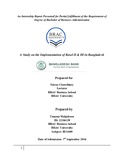A study on the implementation of basel II & III in Bangladesh

View/Open
Date
2016-09-07Publisher
BRAC UniversityAuthor
Mahjabeen, UmamaMetadata
Show full item recordAbstract
This internship report is based on the three months long internship program that I have successfully completed at Bangladesh Bank (BB). It is a requirement for the BBA program of BRAC Business School, BRAC University. My faculty advisor and the on-site supervisor helped me to choose the topic. It is a complex yet very important requirement for banks. The value of the knowledge attracted me the most. Bangladesh Bank (BB) is the governing body of all the commercial banks in this country. To be in line with the international standard for regulation of banking industry (Basel Accord), BB has introduced Risk Based Capital Adequacy guideline relating to Basel II. All banks have to follow this guideline and report to BB effective from 1st January, 2010. Recently, BB has introduced Basel III. Consequently, Basel III capital regulations would be fully implemented as on January 1, 2019. The guidelines are structured in three aspects or pillars: (1) banks should have minimum capital to guard against different kinds of risks (credit, market and operation risk); (2) assessing capital adequacy with risk profile of the bank and capital growth plan and (3) public disclosure of bank’s position on risk, capital and management. This study examines the impacts of Basel II and III in Bangladesh. Banks have to follow the regulatory rules, have to follow the minimum capital requirements. This study examines the implementation of Basel II and III in Bangladesh.
